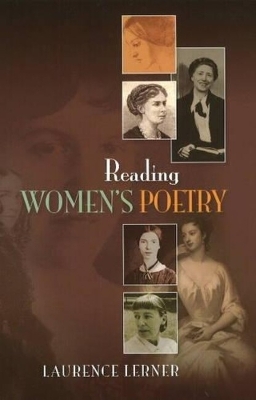Until quite recently, anthologies of English poetry contained very few poems by women, and histories of English poetry gave little space to women poets. How should poetry lovers respond? The book begins by suggesting four possible responses: the conservative, which claims that women have not written many good poems; individual recuperation, which salvages some fine poems by women but without altering the general view of English poetry; alternative canon, which claims that women do not write the same kind of poetry as men, so that their work should be judged by different standards; and cultural recuperation, which claims that women's poetry is a significant cultural phenomenon, and should be read and studied without subjecting it to any tests. All these positions can be defended, and this book has elements of them all. As the title indicates, this book is about reading women's poems, rather than forming theories about them: it explores the experience of reading Aphra Behn, Elizabeth Browning, Christina Rossetti, Emily Dickinson and many others. Beginning with Katherine Philips, the first Englishwoman to achieve fame as a poet, it covers three centuries to the work of Marianne Moore and Stevie Smith, but does not include the many living women poets who deserve a volume to themselves. In order to discuss adequately the work of those included, it was necessary to omit many other women poets: the selection has been made on merit, and to readers who miss some of their favourite poets the only answer can be that the book does nothing to discourage reading other poets. Indeed, it is hoped that the form of discussion of the selected poems will be helpful in engaging further with women poets of all calibres. Do women write differently from men? The author assumes no predetermined answer but is very willing to ask the question; and in order to do so he frequently compares poems by women with poems by men, not so much to ask who writes better as to explore similarities and differences: thus Lady Mary Wortley Montagu is discussed along with Alexander Pope, Emily Dickinson along with Gerard Manly Hopkins and Elizabeth Browning along with her husband. Poems by women should be read, enjoyed, and argued about. They can be related to the time they were written and first admired, or to our views on women's history, or to our expectations of what poetry can offer -- but above all they should be enjoyed. And that is the faith in which this book is written.
- ISBN10 1845193377
- ISBN13 9781845193379
- Publish Date 5 August 2009
- Publish Status Active
- Publish Country GB
- Imprint Sussex Academic Press
- Format Hardcover
- Pages 194
- Language English
